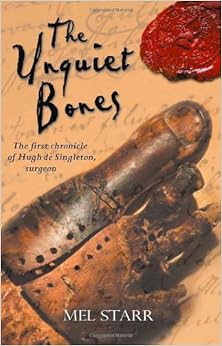 I was struck
from the very beginning of this novel by the style of the prose. The story is
framed as an account in the first person by Hugh de Singleton, a young surgeon
investigating the murder of a girl found in the cesspit of his patron’s castle.
The language is uncomplicated with no aspirations to poetic beauty, but instead
has a wonderful clarity to it. The narrator’s candid honesty and independent
mind made this a joy to read, and gave me the feeling that if Hugh de
Singleton were a real person, he’d be someone I’d very much like to know.
I was struck
from the very beginning of this novel by the style of the prose. The story is
framed as an account in the first person by Hugh de Singleton, a young surgeon
investigating the murder of a girl found in the cesspit of his patron’s castle.
The language is uncomplicated with no aspirations to poetic beauty, but instead
has a wonderful clarity to it. The narrator’s candid honesty and independent
mind made this a joy to read, and gave me the feeling that if Hugh de
Singleton were a real person, he’d be someone I’d very much like to know.
Another
advantage Starr’s novel has over most historical stories is that the narrator
is, himself, imbued with medieval values. Too often, authors simply place a
character with modern attitudes in an historical setting, with no real
consideration for how they could possibly have developed in a way so different
to everyone else at the time. Of course, for the reader to relate to the
protagonist we must have points in common – and in The Unquiet Bones Hugh is very much a progressive, but in a way
that could have been possible at the time. While he favours contemporaneous modern medical
theories, and believes in bathing even in winter, he still takes the
social status quo for granted and respects its boundaries.
As usual
when historians turn to writing fiction, this novel is full of great little details that add to the atmosphere and to the genuine feel of the time.
Everything from the seating and food at dinner to some rather graphic surgical
descriptions and a thorough understanding of the different clothing styles
allowed to various social classes is included. These facts aren’t thrust in the
face of the reader, however, but taken for granted by the narrator as common
knowledge.
The central
mystery itself is well thought out and takes several twists and turns before
reaching its conclusion, and we get to know several ancillary characters as the
story progresses, which makes a nice change from most murder mysteries, in
which the characters encountered are often just there as parts of the puzzle.
This one was
a very pleasant surprise, and I’m happy to discover that there are 6 more left
in the series.
Next up: The Diary of a Provincial Lady by E M
Delafield
No comments:
Post a Comment